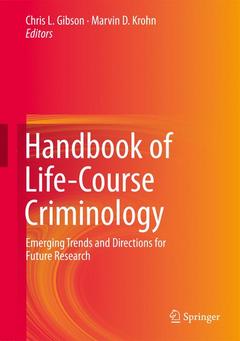Handbook of Life-Course Criminology, 2013 Emerging Trends and Directions for Future Research
Coordonnateurs : Gibson Chris L., Krohn Marvin D.

The wide-ranging scope of the Handbook of Life-Course Criminology covers genetics and environment, child offenders and late bloomers, the impact of school and peers, lifelong and time-limited criminal careers, and qualitative and quantitative methodologies. This unique Handbook is further set apart by its dual coverage of the leading edge of current research and innovative directions for future work in the field.
Pathways to crime have been a central concept of criminology from its inception. Accordingly, a lifespan approach to the field has replaced earlier biological and sociological perspectives with a more nuanced understanding of offender behavior and a wider lens of study. The contributions to this Handbook break down issues of criminal and antisocial behavior from early childhood to late adulthood, examining developmentally targeted prevention and intervention strategies and reviewing emerging trends in research. Among the topics:
· Childhood: including physical aggression in childhood, pre- and peri-natal development, and environment.
· Adolescence: the impact of schooling, unstructured time with peers, gang membership and peer networks.
· Adulthood: Adult onset crime, unemployment in emerging adulthood, crime and adult outcomes.
· Prevention and Intervention: community programs, lifetime intervention strategies, re-entry.
This volume will be a valuable piece for researchers in Criminology and Criminal Justice as well as related disciplines such as Sociology, Developmental Psychology, and Social Policy. It will serve as an important reference for the current state of research, as well as a roadmap for future scholars.
"This impressive Handbook provides comprehensive coverage of key developmental and life course issues in criminology from birth to adulthood, including biology, genetics, gangs, schools, neighborhoods, adult onset, desistance, and interventions. The research recommendations in each chapter are especially important, and they should stimulate advances in knowledge for many years to come. This Handbook should be required reading for all criminologists."
David P. Farrington, Professor of Psychological Criminology, Cambridge University, Cambridge, UK
?In just a few decades developmental criminology has become the dominant intellectual force in criminology. This volume demonstrates why. It provides incisive reviews of important themes in developmental criminology. More importantly, it lays out rich agendas for future research that should inspire the next generation of developmental criminologists.?
Daniel S. Nagin, Teresa and H. John Heinz III University Professor of Public Policy and Statistics, Carnegie Melon University, Pittsburgh, PA, USA
Chris L. Gibson is a W.E.B. Du Bois Fellow of the National Institute of Justice and teaches in the School of Sociology and Criminology & Law at University of Florida. His research interests include Life Course and Biosocial Criminology, Neighborhood and Contextual Development, and Quantitative Methods.
Marvin Krohn is Department of Sociology and Criminology & Law at University of Florida. His research interests in juvenile delinquency focus on theoretical explanations of delinquent and deviant behavior. He is the recipient of a grant from the Office of Juvenile Justice and Delinquency Prevention for "A Panel Study of Reciprocal Causal Model of Delinquency" and one from the National Institute of Drug Abuse for a study entitled "A Social Network Approach to Drug Use of Minority Youth." He is co-editor of the 5th edition of Delinquent Behavior (Prentice Hall, 1991), and the Handbook on Crime and Deviance (Springer, 2009). Recently Krohn received both the University Award and the Chancellor's Award for Excellence in Teaching.
Comprehensive coverage of Criminology research at each stage of Life-Course development
Covers impact of genetics, environment, life events in cases and specific research methodologies
Presents current state of research with areas for future development
Foreword by Terrie E. Moffitt, Knut Schmidt Nielsen Professor, Department of Psychology and Neuroscience, Duke University, Durham, NC, USA
Date de parution : 07-2014
Ouvrage de 341 p.
17.8x25.4 cm
Disponible chez l'éditeur (délai d'approvisionnement : 15 jours).
Prix indicatif 158,24 €
Ajouter au panierDate de parution : 11-2012
Ouvrage de 341 p.
17.8x25.4 cm
Disponible chez l'éditeur (délai d'approvisionnement : 15 jours).
Prix indicatif 158,24 €
Ajouter au panier


